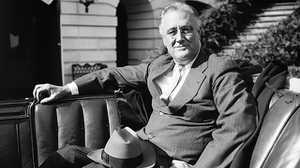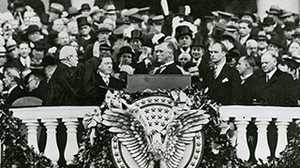Mobilization for Human Needs, 1933
FDR asks for community cooperation to help the needy.
September 8, 1933
Mr. Secretary of State, and you who are the leaders in this cause for the alleviation of human need:
I have been somewhat occupied during the past forty-eight hours with human needs in other parts of the world, outside of our own country -- occupied in the hope that the United States would not have to act outside of its own quarters, in the hope that another Republic will be able to solve its own difficulties just as we are seeking to solve our difficulties And, so, I have no set speech to deliver to you today.
I want to talk to you very simply and very briefly in regard to what might be called "The Whole of the Picture." You are not the whole of the picture and neither am I, but the Nation is. Our task, I think, is to complete the whole of the picture and not leave any unfinished portion thereof.
As you know, the many Governments in the United States the Federal Government, the forty-eight State Governments, and the tens of thousands of local Governments are doing their best to meet what has been in many ways one of the most serious crises in history. On the whole, they have done well. The Federal Government cannot, by any means, accomplish the task alone. The Government has, during these past months, entered into many fields of human endeavor that it has never participated in before.
I believe we Americans do not wish to see a permanent extension of purely Government operations carried to the extent of relieving us of our individual responsibilities as citizens, and it is with that thought in mind that very early in this Administration we laid down in regard to one portion of this great picture a somewhat simple rule.
When we came to the problem of meeting the emergency of human needs, we did not rush blindly in and say, "The Government will take care of it." We approached it from the other angle first. We said to the people of this country, "When you come to the problem of relief, you face the individual family, the individual man, woman and child who lives in a particular locality and the first objective and the first necessity are that the citizens of that community, through the churches, the community chest the social and charitable organizations of the community, are going to be expected to do their share to their utmost extent first."
Then we come to this second need or objective and that is the participation of local government in the additional need. We demand that local government shall do its share to the utmost, and then, if that is not sufficient, if those two features do not meet the needs, we come to the next unit, the State, and if that still is not enough, if the State has done everything it reasonably should do, then obviously the Federal Government must step in, because, while it isn't written in the Constitution, nevertheless, it is the inherent duty of the Federal Government to keep its citizens from starvation. Of course, in an organization of that kind, I suppose that there is a certain tendency to feel, "If we don't do it, the Federal Government will. Municipalities or counties feel, "If we don't do it, the State Government will," or a local organization, private organization, and individuals say, "Well, if we don't do it, the municipalities will." In other words, the tendency is to put the burden on somebody else with the general thought in the back of our heads, "if we don't do it somebody else will, and, in the last analysis, the kindness of Uncle Sam will see to it that we do not fail."
We have had a great many examples of late of areas in this country, areas which have not done their share and are coming, hat in hand to the Federal Government, and saying, "We want Federal relief." There have been States which have not done their share -- states where the problems of relief have gotten mixed up with politics; legislatures that are thinking in political and not in human terms. There are municipalities which are going ahead with the spending of the taxes for political purposes and then find they haven't any money left for relief purposes.
I am glad to say that those individual cases are diminishing in number because the people of this country understand it, and are telling the Government bodies, local or State, that they have to "play ball" and not shirk.
There are a lot of cases which are so close to the border line of emergency that they do not belong to the normal relief problem.
Yesterday, the Governor of South Dakota came to my office with some extraordinary pictures of farm lands where grasshoppers had devoured everything down to the roots, where there isn't anything left for man or beast to eat. There many thousands of farmers are faced not just with the temporary problem of being helped out a little here and a little there, but with the fact that neither they nor their livestock have any chance of getting anything to live on until some time next summer. There is an emergency. We are going to try to take care of it as an emergency. It comes very close to the border line -- where the Red Cross has to step in because it is a real disaster.
There are cases in some of the coal-mining sections of this country where families have been starving week in and week out over a long period of time and where the community or the State failed to do their share. These are not disasters in the same sense or with the same results as grasshoppers and floods.
The point I want to make is this: You have a very great opportunity, not merely to keep people from starving. You have a further opportunity of inculcating the understanding that we have to build from the bottom up -- not merely to supply food from the top down. There will be a tendency this year in obtaining the wherewithal for local relief for people to say, "We can't do it." I believe they can do it, bigger this year and more generously, more successfully this year than they could last. Taking it by and large, the country is in a much more hopeful frame of mind. People have more money to spend and more time in which to do it. It isn't only the fact that a great many people have already been put back to work, the fact that people of property have been getting more from rents; there are fewer defaults on bonds and mortgages.
I believe today that you can go forth, in the spirit of the N.R.A., and work under it. You, of course, are going to work a great deal more than forty hours a week. I want to tell you that you are hereby absolved from the N.R.A. If you want to work seventy hours a week go to it. The executive branches of the United States Government, and some of the other branches of the Government also are exempt.
I think you must go into this campaign with the right to expect greater success this year than last. Tell everybody that we are a little bit like the old railroad train that has to travel up a long grade. The first thing to do is to get that train started and the more we can accelerate the pace of that train, the more certain it is that it is going to get over the top. We have got the train started and it is running, let us say, twenty miles an hour. We must get that train to go forty miles an hour and then there is an assurance that it will go over the top.
All of this community-chest work, all of this uniting in the cause of meeting human needs, is based on that old word "cooperation." During the War when I was on the other side, the Prime Minister of England, Lloyd George, was lunching with me at the American Embassy one day and our Ambassador said something about our cooperation in winning the war. Lloyd George turned to me and said, "You Americans are inventive; you have imagination; will you please send word back home that the British Government will offer a prize of 610,000 to any American who will discover some other word to take the place of 'cooperation'?" No one has ever won the prize yet.
The point I wish to make is that there are a great many people in this country who are going to say, "Oh, I have given, I am helping through such and such an organization, through such and such an individual. Leave me out." There is no such thing as being left out. They can't be left out. They have to join you. Because, unfortunately, we know the frailty of a certain type of human nature that says something like that as an excuse for not doing his or her part.
The Government cannot get along without you. The Federal, State, local Governments can't. The whole period we are going through will come back in the end to individual citizens, to individual responsibility, to private organization, through the years to come. We are going to have unemployed throughout the United States and we know it. I hope, though, the time is going to come when Government will not have to give relief. I hope the time is going to come soon, when everybody who normally wants a permanent job is going to get it. And so I like to think of Government relief of all kinds as emergency relief.
Your work has a two-fold purpose. You are meeting the emergency and at the same time you are building for the future. Community chests are going to keep on just as long as any of us are alive -- and a mighty good thing they are too.
I tell you very simply that you have a great responsibility on your shoulders and I know that you are going to fulfill it. You are going back to your States and your communities and give them this message from me: this work is an essential part of the Government's program, the program of the people of the United States to bring us back to where this country has a right to be. So, go to it, and make a record not only of money but a record of service of which we shall all be very proud.
Text courtesy of the New Deal Network.






